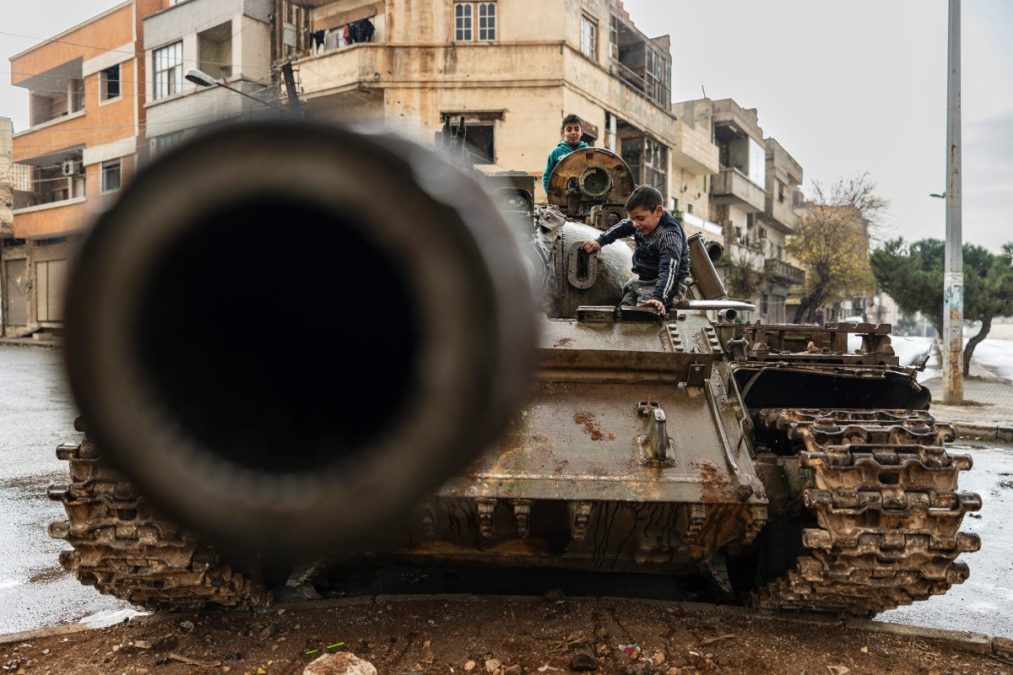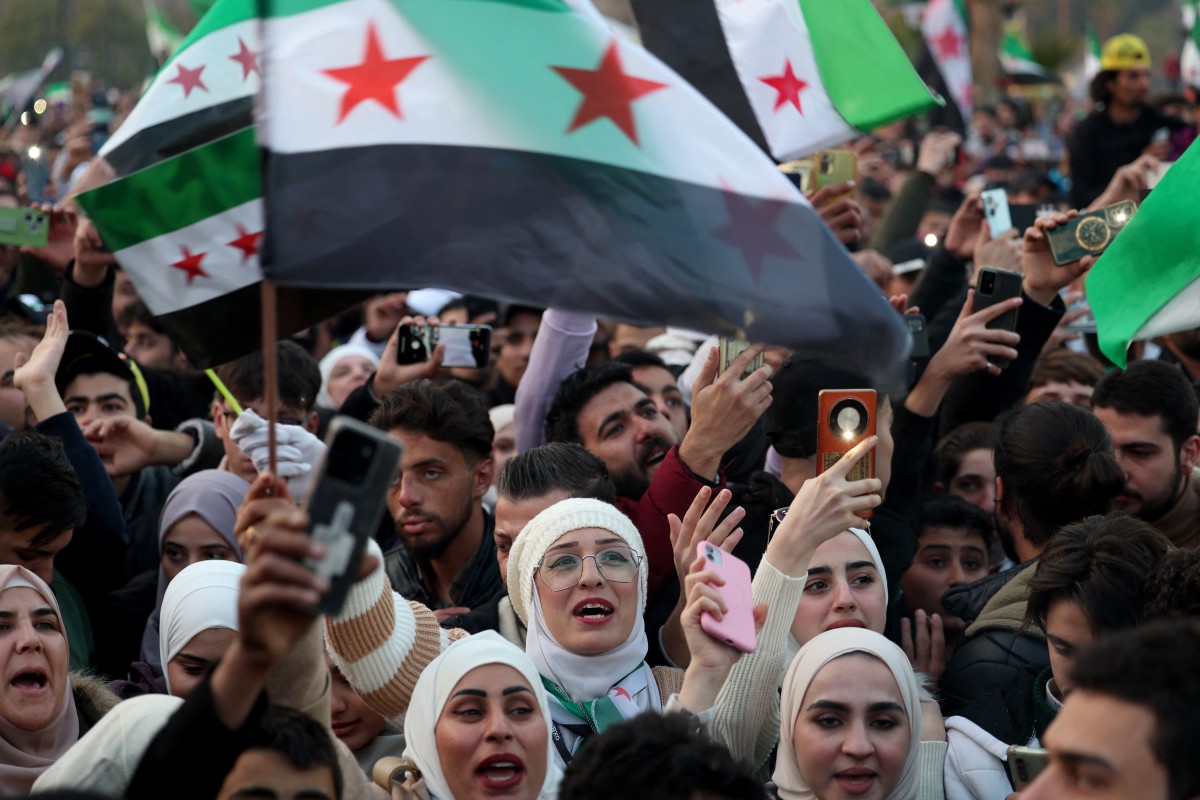Damascus, Syria – Washington is scrapping a long-standing reward for the arrest of Syria’s new leader, a senior U.S. diplomat said Friday, following “positive messages” from a first meeting that included a promise to fight terrorism.
Barbara Leaf, Washington’s top diplomat for the Middle East, made the comments after her meeting with Ahmed al-Sharaa in Damascus — the first formal mission to Syria’s capital by United States diplomats since the early days of Syria’s civil war.
The lightning offensive that toppled president Bashar al-Assad on December 8 was led by the Islamist Hayat Tahrir al-Sham (HTS), which is rooted in Al-Qaeda’s Syria branch but has sought to moderate its image in recent years.
Leaf’s meeting with HTS chief Sharaa came despite Washington’s six-year-old designation of his group as a terrorist organisation.
“Based on our discussion, I told him we would not be pursuing the Rewards for Justice reward offer,” Leaf told reporters.
After their talks, “it’s a little incoherent, then, to have a bounty on the guy’s head,” she said, welcoming the messages from him.
“We will be looking for progress on these principles and actions, not just words,” she said.
After the meeting, a statement from Syria’s new leaders said they wanted to contribute to regional peace.
“The Syrian people stand at an equal distance from all countries and parties in the region… Syria rejects any polarisation,” the statement said.
Leaf said she told Sharaa of the “critical need to ensure terrorist groups cannot pose a threat inside of Syria or externally, including to the US and our partners in the region.”
“Ahmed al-Sharaa committed to this,” she said.
The US delegation also included Roger Carstens, the US pointman on hostages. He said he worked on Friday with the new Syrian leadership to search a location where American journalist Austin Tice could have been held, and “we’ll be working with the interim authorities” to examine other locations.
Tice was kidnapped in Syria in August 2012.
US strikes IS
On a regional tour prior to the Aqaba talks, Secretary of State Antony Blinken had stressed the need to prevent a resurgence of Islamic State group (IS) jihadists.
The US military said on Friday its forces had killed an IS leader and another operative in Deir Ezzor province, part of escalated US military action against the group since Assad’s overthrow.
The US embassy said Leaf also met with Syria’s White Helmet rescuers, civil society leaders, activists and others “to hear directly from them about their vision for the future of their country”.

Below a photograph of Leaf and others with a memorial wreath, the embassy said she had also commemorated the tens of thousands of people murdered, tortured, disappeared or detained under Assad.
“The US commitment to hold accountable those responsible for these atrocities is unwavering,” the embassy said on X.
Turkish pressure
Turkish President Recep Tayyip Erdogan, who backed Assad’s opponents, has stressed reconciliation and restoration of Syria’s territorial integrity and unity.
Turkey has been putting pressure on Kurdish-led forces in Syria, and Erdogan said Friday it was time to destroy “terrorist” groups operating in the country, specifically IS and Kurdish fighters.
“Daesh, the PKK and their affiliates — which threaten the survival of Syria — must be eradicated,” he told journalists following a summit in Cairo, referring to IS and the Kurdistan Workers Party, respectively.
The autonomous administration in northeastern Syria is protected by the US-backed Syrian Democratic Forces, mostly made up of the People’s Protection Units (YPG).
Turkey accuses the YPG of being a branch of the PKK, which both Washington and Ankara consider a terrorist group.
Kurdish leaders in Syria have welcomed Assad’s ouster and raised the three-star independence-era rebel flag, but many in the region fear continued attacks by Turkey and allied fighters.
Leaf said Washington was urging a ceasefire between Turkish-backed forces and the SDF around the Kurdish-held Syrian border town of Kobane, also known as Ain al-Arab.
On a visit to Ankara on Friday, German Foreign Minister Annalena Baerbock warned of the dangers of any “escalation” of the fighting, saying: “Security, especially for Kurds, is essential for a free and secure future for Syria.”
Iran and Russia had long helped to prop up Assad, but on Friday Leaf said she expected Syria would completely end any role for Iran.
Amy Pope, the head of the UN migration agency, on Friday urged “the caretaker government to continue to empower and enable women, because they are going to be absolutely critical to the rebuilding of the country”.
Pope also called for the raft of international sanctions on Syria to be reassessed to help the country regain its footing.
Syria’s civil war killed more than 500,000 people and sparked an exodus of millions of refugees.
On Friday, almost two weeks after Assad’s fall and flight to Moscow, Syrians continued to celebrate. Fireworks exploded over Umayyad Square in Damascus, where flag-waving crowds gathered.
New Syrian leaders want to contribute to ‘regional peace’
Syria wants to contribute to “regional peace”, the country’s new authorities said late Friday, after a meeting between leader Ahmed al-Sharaa and a US diplomatic delegation.
“The Syrian side indicated that the Syrian people stand at an equal distance from all countries and parties in the region and that Syria rejects any polarisation,” the statement said.
It said the new authorities wanted to “affirm Syria’s role in promoting regional peace and building privileged strategic partnerships with countries in the region”.
A Syrian official had previously told AFP that the meeting between al-Sharaa — known previously by his nom de guerre Abu Mohammed al-Jolani — and the US delegation led by Barbara Leaf, head of the Middle East at the State Department, was “positive”.
Al-Sharaa, the leader of the Islamist Hayat Tahrir al-Sham (HTS) group that seized power in Damascus, was previously the target of US sanctions.
But after their first formal contact in Damascus on Friday, Washington announced it had dropped a bounty for his arrest.
“Based on our discussion, I told him that we were dropping the offer of a reward,” Leaf told reporters.
She said she told the new Syrian leader of the “critical need to ensure that terrorist groups cannot pose a threat inside Syria or outside, including to the United States and our partners in the region”.
He “committed to doing so”, she said, adding he had appeared to her as “pragmatic”.
HTS, which leads the victorious coalition of armed groups in Damascus, claims to have broken with jihadism and has sought to reassure people of its ability to revive the country after nearly 14 years of civil war.
France, Germany, Britain, and the United Nations have also sent emissaries to Damascus in recent days to establish contacts with the new authorities.
The West is wary of the risk of fragmentation of the country and the resurgence of the jihadist group Islamic State, which has never been completely eradicated there.
Security for Kurds ‘essential’ for a secure Syria: German FM
Security for the Kurdish people is critical for Syria to have a secure future, German Foreign Minister Annalena Baerbock told her Turkish counterpart in Ankara on Friday.
“Security, especially for Kurds, is essential for a free and secure future for Syria,” she told journalists after meeting Turkish Foreign Minister Hakan Fidan, warning of the dangers of any “escalation” with Kurdish forces in Syria.
Earlier Friday, Baerbock raised the alarm over fresh violence in northern Syria, where Turkish troops and Ankara-backed fighters have been battling the Syrian Defence Forces (SDF), a Kurdish-led group supported by the US.
Ankara sees the SDF as an extension of its domestic nemesis, the Kurdistan Workers’ Party (PKK) which has led a decades-long insurgency on Turkish soil, with President Recep Tayyip Erdogan insisting Friday it was “time to neutralise the existing terror organisations in Syria”.
Her comments came as concerns grew over a possible Turkish assault on the Kurdish-held border town of Kobane, also known as Ain al-Arab, after pro-Turkish fighters seized Manbij and Tal Rifaat, two other key Kurdish-held towns.
As Islamist-led rebels pressed their lightning that toppled Bashar al-Assad, Turkish-backed fighters began a parallel operation against Kurdish-led forces in the north, sparking clashes that left hundreds dead in just a few days.
“Thousands of Kurds from Manbij and other places are on the run in Syria or are afraid of fresh violence,” the German minister said.
“I made it very, very clear today that our common security interests must not be jeopardised by an escalation with the Kurds in Syria.”
No foothold for IS
But she expressed understanding for Ankara’s “legitimate” security concerns, saying “northeast Syria must not pose a threat to Turkey” while also warning that Islamic State (IS) group jihadists must not be allowed to regain a foothold in Syria.
“No one would be helped if the real winner of a conflict with the Kurds turned out to be the terrorists of IS: that would be a security threat for Syria, Turkey and also for us in Europe.”
According to a foreign ministry source, Fidan told her the PKK and the YPG — the main force within the SDF — did not represent the Kurdish people.
“The view that the PKK/YPG represents the Kurds in Syria is wrong,” the source quoted him as saying, stressing Turkey would never allow such “terrorist organisations to abuse the situation in Syria”.
“We expect all our allies to respect Turkey’s security concerns,” he added.
Baerbock also said Berlin would judge Syria’s new Islamist-led HTS rulers on the basis of their actions amid concerns over the group’s Al-Qaeda origins.
“A radical Islamist order will only lead to new fragmentation, new oppression and therefore new violence,” she said.
“We will judge the new rulers by their actions.”








